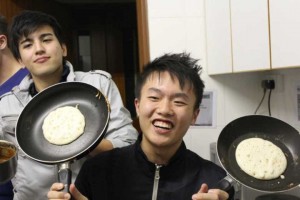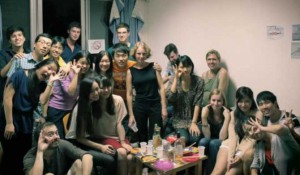by Charles Xu, USA/China
The University of Notre Dame and the Chinese University of Hong Kong have an international exchange program where two students from each university undertake studies at the other university each semester. This past year, I was fortunate to participate in this program for both semesters of my junior year. It was an incredible and nearly indescribable experience on so many levels. While my own study abroad experience was uniquely personal for reasons of family and return, there were also the typical stories of study abroad, though typical does not in any way mean less meaningful.
They say Hong Kong is a cosmopolitan city and the menagerie of foreign exchange students at the Chinese University of Hong Kong reflected just that. I became friends with countless people from all over the world, each with their own story of where they came from and where they were going. Everyone had a different reason for being in Hong Kong. Some came for the local Chinese culture, some for a taste of the fast-paced Asian New York City, and some just to try something different, something new, something bold. And of course, some for Lan Kwai Fong, the infamous bar district of Hong Kong. But for some reason or another and by the luck of sheer coincidence, we had gathered from all corners of the world in one place. The diversity of thought and opinion on nearly every single issue from world politics to cuisine to fashion was disorienting and exhilarating. What kinds of clothes do the Swedes prefer? How do the Chinese and Japanese feel about the Diaoyu/Senkaku islands? What different kinds of dim sum (traditional Cantonese style of serving food) did the Dutch and Koreans prefer? It was quite the miniature United Nations we had. Yet we were still able to bond as close, genuine friends. Because we were all simultaneously dealing with the culture shock of a new environment, and one as intimidating as Hong Kong with its overly crowded streets and subway stations and walls of towering apartment blocks, we were all foreigners in a foreign land. This probably drew us closer than we knew. Thanks to a couple of our friends, our group organized pancake parties where once every few weeks, someone would make a variation of pancakes from their nation. Everyone brought snacks and drinks and a jolly good time was had. I think by the end, a total of 7 pancake parties were organized and countless pancakes consumed. Towards the end of the first semester near Christmas time, one of our Dutch friends, Thomas, suggested we do a secret Santa as well as write a poem for the giftee. As many of our friends were about to depart the shores of Hong Kong, needless to say, there were not just a few soggy eyes. Alas, everyone has now separated, each returning to their respective universities and countries. Yet, we will always be able to remember back onto our exchange time in Hong Kong with fond memories. Not just of the city and its lights, but of the people and experiences. Though there was not an IHOP in sight, as silly as it sounds, whenever I chance upon a waft of pancakes in the air, I’ll be brought back to Hong Kong, to the Chinese University, to International House, and wonder where my friends might be in the world and hope that we might once again share another bite.
My poem to Sabina
I still remember when I first met you at super seafood.
Super short and super nice was what I conclude.
A Chinese girl with a Viet touch
Born and raised in Sweden and spoke as such.
Your diverse background was one of the first to open my eyes.
That there is truly a big world under these skies.
In your time here, I know there were a few bumps in the road.
But keep in mind that everyone saw the kindness you showed.
I will definitely miss you as you return home in just a few weeks.
I am sure there will be tears on many a cheeks.
These friends you have made from all over the world are people you can count on.
Never forget the good times and keep them as fond memories to look back on.
And don’t forget to always remember pancakes in Hong Kong.
For these memories will be with you lifelong.

